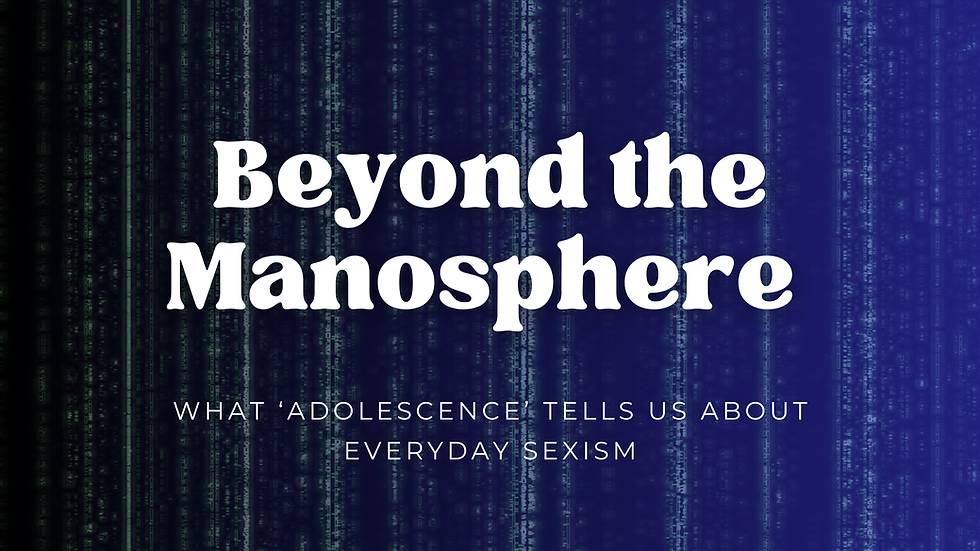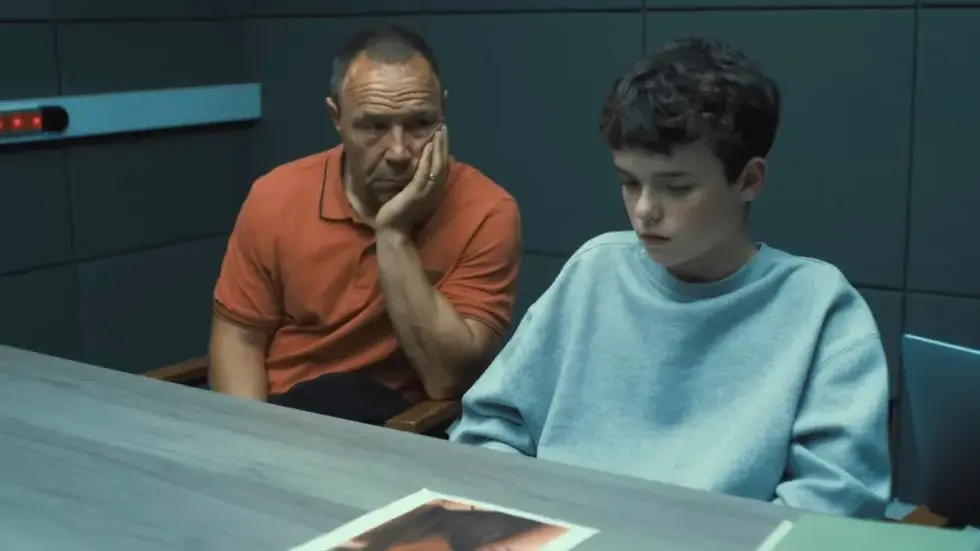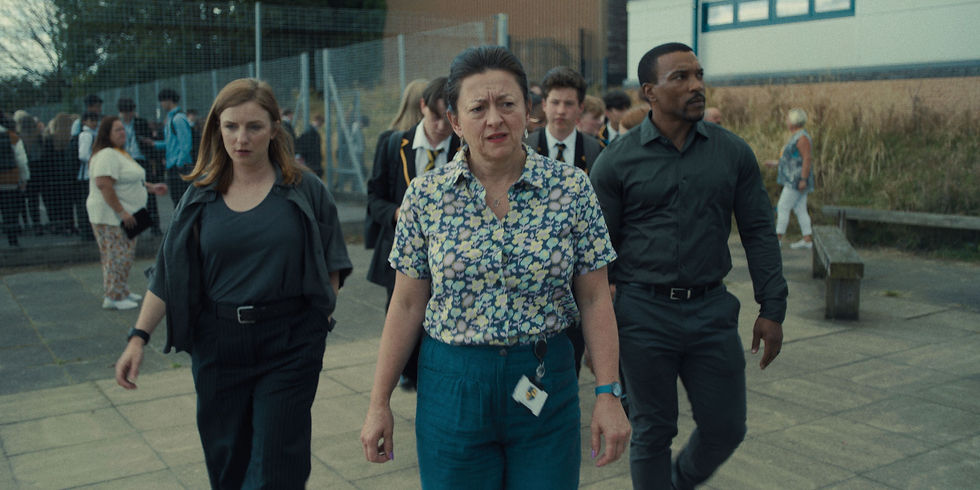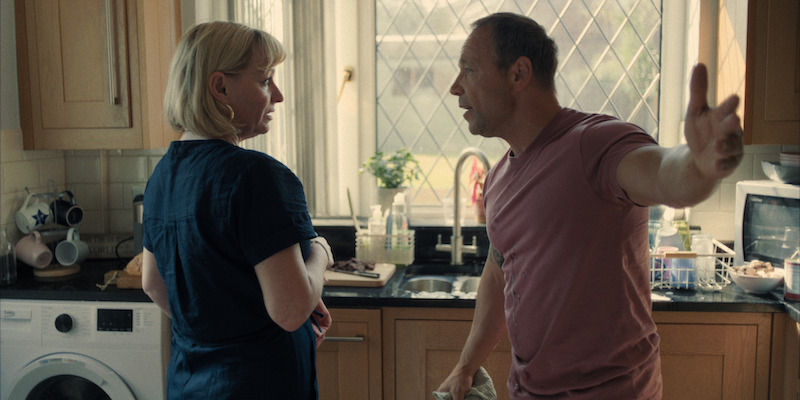Beyond the Manosphere: What Adolescence Tells Us About Everyday Sexism
- Claire Stancliffe
- Apr 30
- 6 min read

It’s been over a month since Netflix released the hit mini-series Adolescence that captured the attention of people all over the world. It tells the story of the brutal murder of Katie at the hands of her thirteen-year-old classmate, Jamie, drawing mainstream attention to the threat of online misogyny. As the story progresses we see this is partly to blame for Jamie’s radicalisation and subsequent horrific act of violence, and we watch as the adults in his life scramble to understand how it happened. It’s brilliantly acted, with fantastic scripts and a fascinating ‘one take’ style that makes the whole thing a gripping watch - it’s no wonder that the show has made such an impact.
There’s no doubt that the ‘manosphere’ (the word used to describe the online world of misogynistic content on websites, forums and social media) is something we all need to be paying attention to and seeking to understand if we want to support young people and protect them from radicalisation like Jamie. What I found more interesting and impactful about the show, though, was the smaller and more subtle clues about everyday sexism that the writers left for us to find.
It’s tempting to cast online influencers as the ‘boogeymen’, but in reality, society sends young people messages about what makes a man or a woman, which behaviours are desirable and which are to be avoided, pretty much from the moment they are born. Whether from teachers, parents, family or peers, these messages can be just as damaging to their confidence, their sense of self and their emotional and mental health. It’s this backdrop that helps create an environment in which boys can become isolated and might seek to find answers online.
Here are 7 moments in particular that caught my attention, in case you missed them:
She’ll sort it: Detective Bascombe’s words in the opening moments of the show — said about his partner Tracey, after hearing a voicemail from his son asking to stay home from school again — reveal a lot in just a few seconds. Deep in his work, Bascombe shows little curiosity about why his son might want to stay home, and instead assumes it’s the mother’s job to deal with it. The emotional heavy lifting is quietly delegated. For me, this moment served as a reminder of how easily young people’s calls for help can be overlooked, especially when they don’t come in obvious ways. Thankfully, we see father and son connect more emotionally in a later episode.
Eddie’s attempts to comfort his son: The whole relationship between Eddie and Jamie is fascinating, and portrays beautifully the complex ways that men navigate emotions and intimacy. All of Eddie’s actions portray a great love of his son, as well as the desire to protect him, but even as Jamie sits sobbing in the police station, we don’t see physical intimacy between the two. Despite clearly caring about his son and desperately wanting to help him, we see Eddie tell Jamie to eat his cornflakes, rather than offering a hug. This is in stark contrast to the sort of comfort we might expect a mother to give in the same circumstances. A lack of intimate relationships becomes a growing theme for many boys as they get older, and move into manhood, and it’s easy to see how when male role models struggle to model this themselves. Later, we come to understand that this links back to Eddie’s own relationship with his abusive father.

Man-code on display: The arrival of Jamie’s lawyer brings with it an interesting example of the ways we uphold gender roles and expect them of others. In particular, I was struck by the phrase “Raise that chin up, be a good dad and suck it up.” Meant as a pep talk while Eddie struggles to hold it together, in this phrase the lawyer sums up the role we often expect fathers to play. Stoic and strong, a good dad does not let his emotions get in the way of being there to fight for his son. Afterall, if he cannot hold it together, who will?
Unconscious sexism at school: The well-meaning teacher at school who shows the detectives around the building describes Katie as a ‘beautiful little girl’, showing our common tendency to judge girls on appearance first. Research consistently shows that even well-intentioned teachers often unconsciously praise girls for their appearance while emphasizing boys’ abilities and achievements, reinforcing traditional gender expectations from a young age. The same teacher then goes on to introduce the male detective to the class, while almost forgetting to introduce his female colleague. Not a malicious attempt to undermine her, but an insight into what might be a subconscious attitude of the teacher, and an instant message to the young people in the room about who they should defer to.

Male teacher shouting: During our tour of the school alongside the detectives, we witness one male teacher in particular shouting aggressively at the boys, while using a completely different and much gentler tone with the girls. This difference in communication style reinforces the assumption that boys are tougher and can handle harsher treatment, while girls are in greater need of nurturing and protection. Over time, these subtle differences can lead to feelings of alienation in boys, discouraging them from expressing vulnerability and seeking emotional support when they need it. It’s a small but telling example of how everyday interactions can shape young people’s understanding of gender roles and emotional expression.
Miller family dynamic: We see this unfold in the final episode as we watch Jamie’s family deal with the fallout of his actions. Eddie is very much the man in charge, while his wife and daughter, Manda and Lisa, go to great lengths to accommodate his mood and his temper. Perhaps best summed up by his frustrated outburst “Girls, please,” we see both affection and dismissal all at once. It highlights the way women and girls are often expected to manage the emotional landscape of a family, smoothing tensions without being invited to express their own needs. Eddie’s dominance in the household mirrors the broader social expectation that men take up more space, while women are tasked with adapting around them.

Desire to toughen up: We hear both Jamie and his dad talk about Eddie’s attempts to get his son into sports in an attempt to toughen him up. This reflects a narrow idea of masculinity, where physical toughness is equated with emotional resilience, and where sensitivity is seen as a weakness to be corrected. Despite knowing that Jamie has a talent for art, Eddie steers him towards football and boxing, in his own misguided efforts to help his son fit into traditional gender norms. Eddie’s well-meaning but rigid expectations leave little space for Jamie to express vulnerability, setting up a dynamic where emotional suppression becomes a marker of ‘being a man.’ Only much later when he is in prison, does Jamie get to reconnect to his creativity by taking up art again.
These are just a few of the many smaller examples of sexism and traditional gender norms that were weaved into the show, and which demonstrate effectively the complex variety of influences that can lead to violent misogyny. They allow us to see that Jamie’s radicalisation did not occur in a vacuum, even with a loving family around to support him in the best way they knew how. So while keeping kids safe online should of course be a major focus, we should not forget that there is work to be done offline too. How can we model a healthy range of emotions to boys, as well as giving them the tools to process them? How can we help them build intimate relationships where they can share their worries free of judgement? How can we signal to them that being a man is not all about being a hero, and that setbacks are ok? These are just some of the questions we can be asking ourselves — because if we want to tackle the problem at its roots, we need to look not just at what boys are exposed to online, but also at the everyday messages they receive about who they are allowed to be, and what drives them there in the first place.



Comments